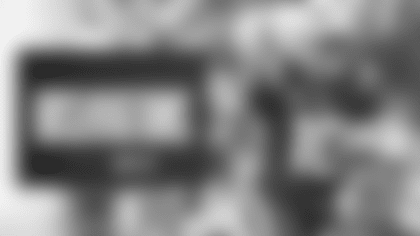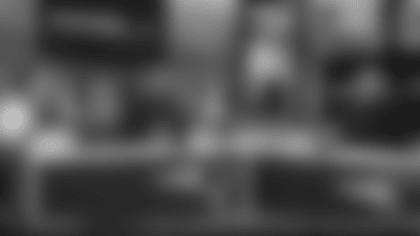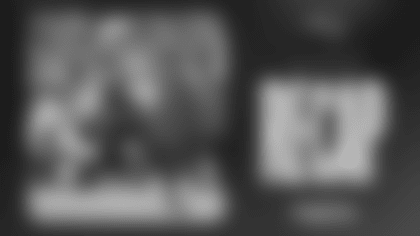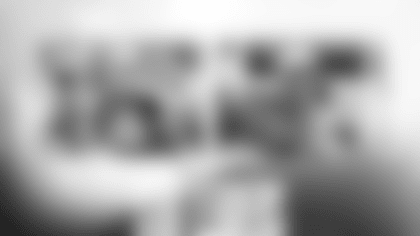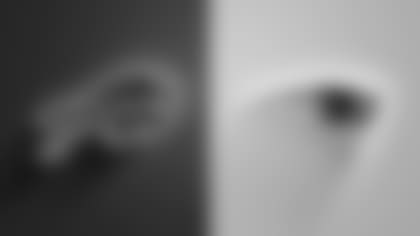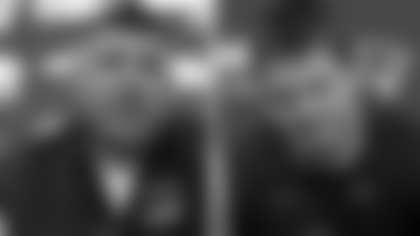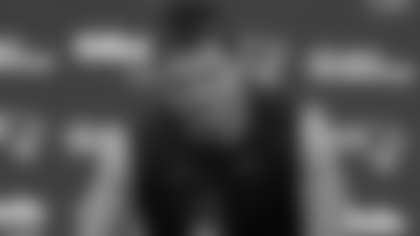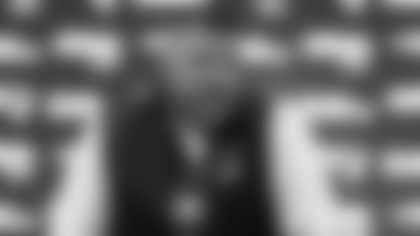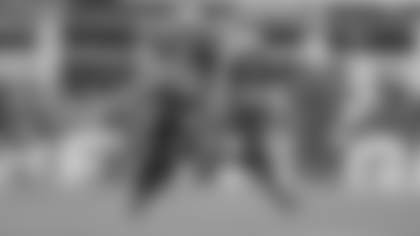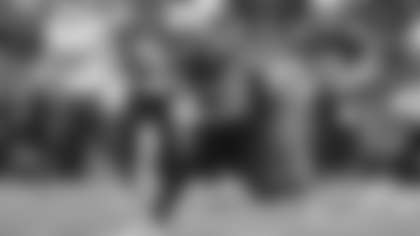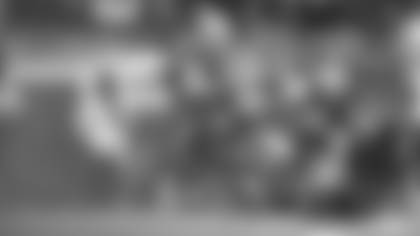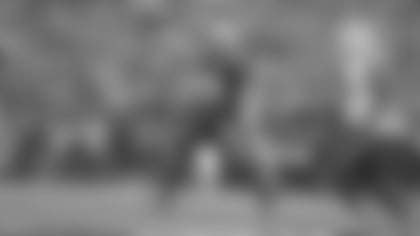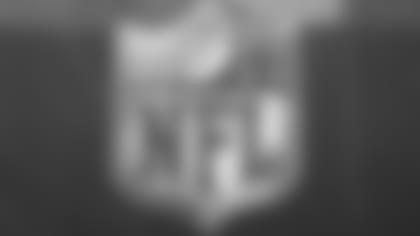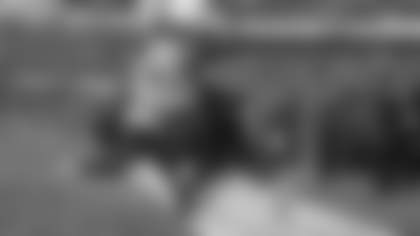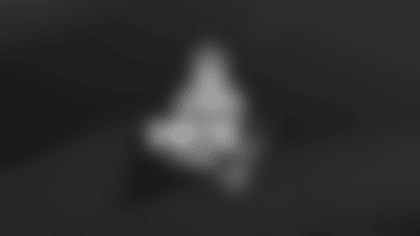[

]()
Drew Bledsoe
Press Conference
November 13, 2001
Dr. Zarins: and also maybe get some other questions answered about his original injury. So I think that I will sort of set the groundwork and then Dr. Berger can give you some indication about the nature of the injury and then we can answer some questions.
The injury occurred on September 23rd. Drew was wearing a flack jacket and he got hit pretty hard in the left chest. He was stunned and initially had no chest pain. About a half-hour after the game ended in the locker room he started having left-sided chest pain. We started taking some x-rays, but he was having a fair amount of pain and things were changing so we sent by ambulance to Mass General Hospital. When he arrived at the hospital he had a series of tests that showed that he had blood accumulated in the left side of the chest and Dr. Berger under took treatment at that time. Maybe I will turn it over to Dr. Berger.
Dr. Berger: Thank you. Mr. Bledsoe arrived by ambulance from the game and we evaluated him as we would evaluate anybody who was in an accident and what we found was that his left chest had become full of blood. We evaluated his head as well as his chest and his abdomen and the only injury that we found was his left chest. At that time I placed a chest tube into the left chest and drained blood from his chest. We connected that tube up to a device which allows us to give his blood back and basically the only blood that Mr. Bledsoe received during the entire course of his hospitalization was his own. The tube remained in for several days after he had been admitted to the hospital where we were watching him to see if his bleeding would continue. The bleeding stopped on its own without any measures we needed to take and the chest tube was subsequently removed. He eventually was discharged from the hospital in stable condition and he subsequently was followed with chest x-rays. He developed some fluid in his chest which is what is to be expected after this type of injury, you get a reactive effusion which is a clear fluid, not blood that develops in the chest after you have an injury. That was removed in several different attempts with a radiologist helping us and also that is completely normal and to be expected. At present his chest x-ray is completely normal, there is no blood in his chest and we feel that he is completely healed from this injury.
Dr. Zarins: I think the decision on return to play is a difficult one. Actually two weeks ago I think that structurally we thought he was healed but he was still weak and so for the last two weeks Drew has been practicing and he is getting into better shape and I think we also wanted to see if there was going to be any reaction from his return to activity. So I think that he has stood the test of time you might say for the past few weeks so we feel a lot more confident about sending him back. We have also had Drew evaluated by five specialists in lung injuries and everyone, it is the opinion of all the consultants who have seen him, that his current injury has healed and that there is no residual problems from his injury.
Q: Drew do you want to say anything?
DB: I would just like to quickly thank Dr. Berger and all of the medical professionals that helped me through this situation. I have said it before, one of the real positives of being a professional athlete in New England is that you have access to the very best medical care in the world and that is what I believe I received in this situation. That being said I'm excited that I am healthy, I am excited that I have a chance to come back and compete and I feel good about the situation.
Q: Dr. Zarins, did the lung specialists see Drew personally or did they see his x-rays and the other question is it that way after 51 days of this happening, why is this press conference happening now? What is the purpose in the hospital's eyes or your eyes?
Dr. Zarins: I think in general the team doesn't really like to make a big deal of medical injuries and medical reports. I think the coach likes to give the answers and so forth. I think that in this instance there has been so many questions raised that perhaps he can't answer and I think that he wants the correct answers out there so he asked us to answer the questions, the medical questions that he can't answer.
Q: I was told on fairly good authority that he did have a collapsed lung it was only a matter of semantic, can you address that?
Dr. Berger: Drew never had a collapsed lung. A collapsed lung means that there is air that gets in between the chest wall and the lung itself. At no time did he have a collapsed lung. He had what we call a hemothorax, he did not have a tneumothorax which is what a collapsed lung.
Q: Now that that is cleared up, how have you figured out that he can take a hit?
Dr. Zarins: Well that is why we have waited a few extra weeks and he has practiced and I think that from the medical aspect we believe the injury is healed. Maybe Dr. Warshaw can address that.
Dr. Warshaw: One of things we know about Drew's injury is what wasn't there. There was no evidence of a broken rib. There has never been any evidence of an injury to the lung itself, which is partly the answer to the previous question, there was no laceration of the lung there was no contusion of the lung. The lung was a passive bystander that wasn't injured in this. So the only thing that was injured that we have any knowledge of or any evidence for is the blood vessel that bled. That stopped obviously and what we know about wound healing is that wounds heal with maximum strength achieved by about six weeks. So he is back to his normal state as far as the strength of the area of the blood vessel injury that bled. In addition when you have blood in the chest even for a short time, there tends to be a gluing, if you will, of the lung to the area of the chest wall. So he actually in some ways has some protection that I haven't got, beside the fact that he is a hell of a lot bigger than I am, but he has some protection that he didn't start with in terms of the lung adhering to the area of the blood vessel that was broken. So we have every reason to expect that he is normal in that sense.
Q: Dr. Zarins I think you used the word stunned, did he have a concussion?
Dr. Zarins: I was right next to the play a few feet down and I was there within a few seconds and he was not unconscious, he was completely awake, he had no amnesia and he had no signs of a head injury. He got hit hard and his whole body got hit hard, that includes the head and the chest and so forth. I evaluated him neurologically and he passed all of his neurological tests that we use for concussions, so there was no loss of consciousness or neurological problems.
Q: Are you talking about on the field or after the game?
Dr. Zarins: Right after the injury on the sidelines before he went back in. But it was a big hit and Drew went back in and I think that after the big hit he was not completely back to normal and I think the coach recognized this and we recognized this and he came out. So I think that things evolve and change, so I think that at the moment it is perhaps a matter of semantics. I don't think he had a true concussion to answer that question.
Q: Drew how do you feel physically and mentally as far as taking a hit?
DB: Are you talking now?
Dr. Zarins: Or after the injury?
Q: No right now?
DB: Right now, I am itching to get back in. I feel healthy. I am putting weight back on. I am about probably ten pounds away from where I was when I got hit and a lot of the weight that is not there didn't need to be anyway. So yeah I feel strong, I feel like I am in good condition. I have been working out for a couple of weeks now and I have been throwing the ball pretty hard for the last couple of weeks. I feel great.
Q: What about then, how did that feeling then, to go back to the game, how did that compare to other injuries or have you even had anything comparable?
DB: Well when I was hit initially, as Dr. Zarins said, I didn't have any pain in my chest other then the guy hit me pretty hard, but it wasn't something that I immediately recognized as a unique type of injury or type of hit. It was a very good hit. Then as I was leaving the field after the game, Ron O'Neil, our trainer, called me into our training room because he didn't really like the way I looked and that is when they kind of started doing a few tests and that is when I started to be in pain so that is when additional steps started to be taken.
Q: Dr. Berger if Drew gets hit again what is the risk?
Dr. Berger: Well I think that this is a very unusual injury. I don't think that we have ever seen an injury like this in a professional athlete, I certainly haven't and I don't know if anybody in this hospital has. I think that the chance of him having a re-bleed is significantly lower than it was prior to him having this injury fir just what Dr. Warshaw mentioned before. When you have an injury to your space between your chest wall and your lung that space scars after the injury heals. Consequently things are stuck over where those blood vessels run that weren't there before or aren't there in you or I if you haven't had a chest injury like he had. Consequently I think the chance of him having a re-bleed is lower than it was before he was actually injured this time.
Q: Drew had trouble breathing, did he not?
DB: When?
Q: On the way to the hospital?
DB: Well I was in pain and obviously my chest cavity was filling up with blood so my lung capacity was diminished because of the blood that was in there. But I was never in a situation where I couldn't get enough air, but my lung capacity was obviously was diminished because a lot of that space was taken up by blood.
Q: Could his lung expand?
Dr. Berger: What makes him short of breath when he has this injury is that the lung can't expand against the blood. Consequently, you can't take the same breath that you would take if you didn't have blood in the chest cavity. At no time was he in danger of needing assisted ventilation. He was awake and talking the whole time that he was in the hospital from the minute that I saw him and I was there when he rolled in from the ambulance and he was talking to me the whole time and communicating with me the whole time. We did put oxygen on to help get him more oxygen, but at no time was he in respiratory distress.
Dr. Warshaw: The lung can expand and did expand, it just can't expand completely and so it is a percentage change.
Q: What did you learn, if anything from this, about sending somebody back into the game after such a big hit?
Dr. Zarins: I think that, things change and I think that immediately after an injury very often there is not much pain. So if somebody injures a knee for example, it may feel wobbly and unstable but it's not very painful. So you don't have the normal protective mechanisms of pain in the early stages to evaluate. So we on the sidelines wait for some time to develop to see which way the injury goes. I think that things change and we keep making reevaluations. So sometimes if somebody has an injury and we let them go back in and we reevaluate him when he comes back in and the thing has changed then we change our minds. So it is a dynamic situation.
Q: You said the coach noticed, did you noticed anything that said that he should come right back out?
Dr. Zarins: There's nothing that I could see, this is communication they had with the coach. Maybe Drew can address that.
DB: I had communication with some of my teammates and based on the communication I had with them they went to Bill [Belichick] and said, 'Maybe he should come out of the game.'
Q: That was Damon [Huard]?
DB: Damon and Marc Edwards I believe.
Q: Damon said you were having trouble with the plays in the two –minute offense, which normally you would know without any problems?
DB: There were some things that were a little fuzzy. But the thing that I will say is that when you play this game and not so much necessarily at the quarterback position but more so at the other positions, you go through the course of a game and you get hit and there are times during probably half the games I have played in where you have a little fuzziness, where you are not completely clear. If guys had to come out of games every time they got a little dinged there wouldn't be very many players on the field. It's a situation that you deal with constantly.
Q: Do you see yourself playing Sunday? Is Sunday too quick?
DB: If it is within my power to be on the field on Sunday…put it this way, I am going to do everything in my control to be on the field on Sunday. Ultimately that is not my decision, but given the opportunity, I can't wait. Between now and then I am going to do everything within my power see that that happens.
Q: In light of the success the team has had, do you still feel like this is your team?
DB: Yeah, I think so. I think that the guys still look to me and I still have the presence in the locker room and with the team and so on. The team's done great. [Tom] Bray's played excellent football and I am ecstatic about that, but at the same time it is bitter sweet because I want to be on the field while it is going on. But at the same time, I know that the team is firmly behind me and they are behind Brady at the same time. I know that you in the media would try to make that impossible, but that's the way it is with our team. The team is firmly behind me and at the same time they firmly support Tom.
Q: How different of a challenge is this for you? In all due respect you have never really worked for…?
DB: Oh yeah, I never worked for it at all. You're right. Would you like to rephrase your question please?
Q: You have been the first stringer here for eight years without much challenge. Now all of a sudden there is kind of a challenge?
DB: First of all I'll say as I have said on a number of occasions, that nothing is promised to anybody in this game. From the time I was very young in this game I felt that I had to go out and prove it on a daily basis. As far as the time since I have been in the league, from the time I was a rookie, from the first week of the regular season on I have been the starter on the team and I anticipate being the starter on the team again. That being said, I've got to go prove it again. I've got to establish that I am the best guy for the job and that I'm the guy that gives us the best chance to win football games. But at no time has, for whatever reason, at no time has it ever been promised to me that I am going to be the starter regardless of what happens and anybody who believes otherwise is sorely mistaken.
Q: Being on the sidelines for seven weeks, did it give you a new perspective?
DB: Yeah it has been different, it has been educational a little bit to see the process that goes into getting plays called and how decisions are made and being privy to some of the conversations that I wouldn't have heard otherwise. That part of it has been enlightening and it has also been unique from the standpoint of being able to look at the game and analyze the game without having the obvious focus of looking at my play and determine what I can do better. I have been able to look at our team and look at what we are doing from a more broad perspective I guess.
Q: You are the only one who knows how hard you were hit, have you been hit harder and not been hurt, in your mind is this kind of a freaky thing?
DB: Well yeah, obviously it was a very, very unique injury. As you have heard these are some very experienced doctors that have never seen something quite like this. Yeah I have been hit hard a lot and to compare this one to other ones in my career, I don't know, I have been hit hard a number of times, but this one, it was unique and obviously it was not only the magnitude of the hit, but the angle and all of those things that went into it that caused this very unique injury.
Q: Do you feel that you should be the starter, do you feel that you should lose your starting job?
DB: Like I said there is nothing promised in this game and if you get injured and the other guy comes in and plays at a higher level than you are capable of playing then he continues, but at the same time if I come back, now that I am healthy, and if practice I show that I am the better guy for the job then I should play. So that is where it stands. I will say I have a great deal of confidence in my ability to play this game and I intend to make it very hard for [Tom] Brady to stay on the field, but hey if he is playing better than I am he will keep playing.
Q: Will it make you a better quarterback?
DB: Will it make me a better quarterback, yeah competition is always good if it is treated as such and if it is honest competition between two guys and I think that what you will have between Tom and myself is you will have…hey I am going to support this guy today and if he is on the field playing I am going to give him everything I have got to help him play well and if I am on the field he is going to do the same for me. When competition is treated that way it is nothing but a positive thing for those involved.
Q: How do you approach this psychologically knowing that you are going to get hit at some point?
DB: Well I have been hit a few times and as a quarterback that is a continuous battle that you are going to fight regardless. To say, 'Okay I have been hit however many times in this game and now I have got to go back in there and I have got to sit in there and make the throw the next time.' It's a battle that you fight regardless of whether or not you have been injured and that is universal. If you can't win that psychological battle on a day-to-day basis then you can't play the position, so I won't really treat this any differently now in my approach game then I would have prior to the injury.


